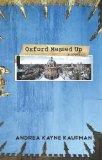Summary | Excerpt | Reading Guide | Reviews | Beyond the book | Read-Alikes | Genres & Themes | Author Bio

A Novel
by Peter BognanniPeter Bognanni's The House of Tomorrow is a fresh and creative novel that I truly enjoyed reading. The story is told in the first person from the perspective of Sebastian Prendergast, a sixteen-year-old boy who is home-schooled by his determined - if not a little bizarre - grandmother in a geodesic dome. His entire world is created and controlled by Nana, a disciple of futurist R. Buckminster Fuller, so when Sebastian meets Jared, an angry, punk-rocking, chain-smoking heart transplant survivor, he discovers that there is a lot to learn about the outside world and himself. Set in rural Iowa, where the hottest local hangout is church, the boys envision that winning the youth group talent contest will be their first step towards becoming glorious punk rockers.
Bognanni uses first person narration, which adds tremendously to the story because it puts readers in Sebastian's shoes and allows us to learn all over again the wonders of gooey processed foods, high school crushes and ridiculously loud rock and roll. Sebastian's dorkiness is simply unavoidable, which makes him an easy mark for Jared's sarcasm, and his futuristic way of speaking entertains without sounding overdone or like he's auditioning for The Coneheads.
However, the real reason to love this book is Jared. This character alone makes the book worth reading. He is sharp-tongued and witty, vulnerable, and has the creativity of a lonely child. So when he finds himself with a new friend, he wavers between being overjoyed and scared. His solution is to boss Sebastian around, which results in hilarious dialogue, a particular strength of the novel. Bognanni also captures the complex dynamics - some subtle, others not so subtle - between family members. Meredith is a great counterpart and older sister to Jared; she dishes out insults as a way of bonding with her brother, protects him when it's least expected, and reveals her own vulnerabilities in a few quiet moments that are a joy to read. And, of course, the siblings only seem to cooperate with each other when it involves teaming up against their mother, Janice Whitcomb.
While I think that Mrs. Whitcomb and Nana are essential and well-described characters, they fall short in comparison with the dynamic teens. They both seem slightly one-dimensional - Mrs. Whitcomb as the worrying mother and Nana as the obsessive eccentric. Perhaps, if these characters were a little more complex, the ending would not feel as convenient. Events wrap up too easily and the book loses some of its punch, but again, the dialogue and character development of Sebastian, Jared and Meredith are so well done that you hardly notice. The plot of the story isn't particularly fast-paced or driving; in fact, at times it feels a little slow. This is because The House of Tomorrow is about the small events that enrich - about the rich conversations people have while practicing musical instruments together, how sharing CDs can be a window into someone's soul and how shared situations create a deep bond between people even if they don't always treat each other right.
 Peter Bognanni is a graduate of the Iowa Writers' Workshop. He is a 2008 Pushcart Prize nominee, and his short story "The Body Eternal" was chosen by Stephen King as one of the "100 Most Distinguished Stories of 2006." He once played in a terrible high school punk band.
Peter Bognanni is a graduate of the Iowa Writers' Workshop. He is a 2008 Pushcart Prize nominee, and his short story "The Body Eternal" was chosen by Stephen King as one of the "100 Most Distinguished Stories of 2006." He once played in a terrible high school punk band.
"I have a theory that music never sounds as good as when you first discover it. ... I still love music today, probably in a healthier way, but when I set out to write my first novel I tried to tap back into that feeling of complete obsession."
Read a list of songs Bognanni "revisited, discovered or wanted to be" as he was writing The House of Tomorrow, on the NY Times blog, Paper Cuts
![]() This review was originally published in The BookBrowse Review in March 2010, and has been updated for the
March 2011 edition.
Click here to go to this issue.
This review was originally published in The BookBrowse Review in March 2010, and has been updated for the
March 2011 edition.
Click here to go to this issue.

If you liked The House of Tomorrow, try these:

by David Mitchell
Published 2021
The long-awaited new novel from the bestselling, prize-winning author of Cloud Atlas and The Bone Clocks.

by Andrea Kayne Kaufman
Published 2011
Oxford Messed Up is a unique literary love story that transports readers on a meaningful and emotional journey where the academic world of Oxford, the music of Van Morrison, and an old claw-foot bathtub serve as a backdrop for learning, self-discovery, and transcendent love.
Your guide toexceptional books
BookBrowse seeks out and recommends the best in contemporary fiction and nonfiction—books that not only engage and entertain but also deepen our understanding of ourselves and the world around us.